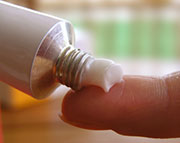- Recognizing the Signs of Hypothyroidism
- 10 Strategies to Overcome Insomnia
- Could Artificial Sweeteners Be Aging the Brain Faster?
- Techniques for Soothing Your Nervous System
- Does the Water in Your House Smell Funny? Here’s Why
- Can a Daily Dose of Apple Cider Vinegar Actually Aid Weight Loss?
- 6 Health Beverages That Can Actually Spike Your Blood Sugar
- Treatment Options for Social Anxiety Disorder
- Understanding the Connection Between Anxiety and Depression
- How Daily Prunes Can Influence Cholesterol and Inflammation
Coping Tips for Winter Skin


The cold, dry air of winter can deplete your skin of moisture and cause “winter itch.”
But you can take steps to protect your skin and prevent that itchy feeling, according to Dr. Robyn Gmyrek, a dermatologist and director of the Skin and Laser Center at NewYork-Presbyterian/Columbia University Medical Center.
Moisturize daily with petrolatum- or cream-based moisturizers, Gmyrek said. Apply them directly to your wet skin after a bath or shower so that the moisturizer can help trap surface moisture. For sensitive skin, choose a moisturizer without fragrance or lanolin.
Clean your skin, but don’t overdo. Too much cleansing depletes the skin’s natural moisturizers, Gmyrek explained. Washing your face, hands, feet and between the folds of your skin once a day is enough. You can rinse your trunk, arms and legs daily, but you don’t have to use soap or cleanser on these areas every day.
Limit your use of hot water and soap. If you do have winter itch, take short, lukewarm showers or baths with a cleanser that is non-irritating and non-detergent-based. Apply a thick cream or a petroleum-jelly-type moisturizer right away, and then gently pat skin dry, Gmyrek said.
Room humidifiers can help prevent indoor air from becoming too dry, she added. When you’re outside, protect your skin from wind, extreme cold and sun. Don’t use tanning beds or artificial sunlamps, which can damage your skin and increase your risk of skin cancer.
See a dermatologist if you have persistent dry skin, scaling, itching or skin growths that concern you. This applies throughout the year, not just during winter, Gmyrek said.
More information
The American Osteopathic College of Dermatology has more about dry skin.
Source: HealthDay
Copyright © 2026 HealthDay. All rights reserved.










